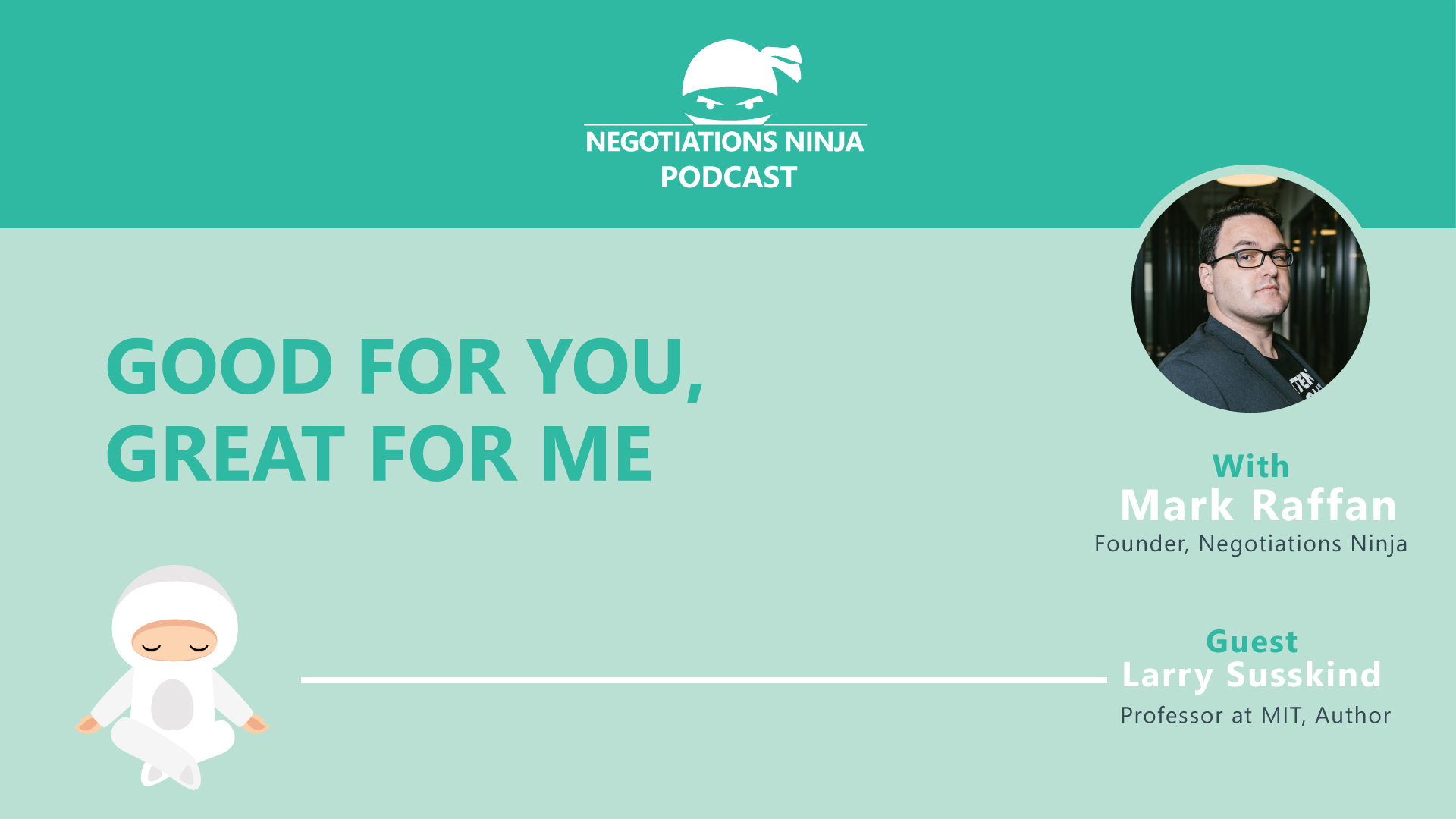In this episode of Negotiations Ninja, Larry Susskind—MIT professor and co-founder of the Program on Negotiation—joins us to talk about his book “Good for You, Great for Me.” We talk about how to negotiate against the 900-pound gorilla: the organization that seems to have leverage in negotiations because of its size. Larry discusses “the trading zone”—the space where you can create deals that are “good for them but great for you” while maintaining trust. We even talk about a simple strategy you can use to get closer to an agreement. Check it out.
Outline of This Episode
- [4:59] Playing the game of “what if” can create value
- [8:26] How to mentally prepare to dwell within ambiguity
- [18:32] Negotiate against the 900-pound gorilla with an elegant solution
- [23:29] Create multiple relationships within organizations to build alliances
- [28:33] How to overcome what appears to be irrational or illogical positions
- [31:42] Spend more time preparing for any and every negotiation
- [35:36] How to learn more about Larry Susskind
How playing the game of “what if” can create value
- Larry likes to play a game he likes to call “What-if.”
- What if I gave you this? Would you give me that?
- What if I did this and this? Would you do that?
They’re trades posed as “what-ifs.” If you can agree to spend some time trying to “what-if” without making commitments, people discover things they can agree on. But you can’t do that if you haven’t given any thought to the interests of the other side. You need to know what to pose as the “what-if.” So spend some time preparing for the negotiation imagining “what-ifs.”
Larry believes you should learn what’s important to the counterparty: what they want to get out of it, what they’re worried about, etc. Then share your side. There’s no point in proceeding if you’re unaware of what each side wants. You’re not asking them to reveal their BATNA but simply asking what their interests are—playing the game of what if can create value.
How to mentally prepare to dwell within ambiguity
In his book, Larry says, “Those that can live with ambiguity a little longer are more likely to reap substantial benefits than are those who seek to quickly eliminate it.” People who can’t handle ambiguity get stressed out by it. How can you mentally prepare to dwell within ambiguity?
According to Larry, the longer the period of inventing without committing and the longer the game of what-iffing, the more likely you will stumble on something good for both sides. If you jump at something pretty good because you’re worried it might disappear, you might never discover something that could be very good.
What’s the solution? Negotiate how you’re going to negotiate before you start inventing without committing. Agree to ground rules and timeframes. Then you move to commitments. That’s the method for managing ambiguity. Nothing is a deal until everything is a deal. Some people try to negotiate line-by-line, which isn’t always the right approach. Setting the ground rule of “no commitments” during this process allows you to go back and change your trades before the deal is finalized.
Negotiate against the 900-pound gorilla with an elegant solution
Larry was once asked to help small companies negotiate against monopolies. The first thing he suggested was figuring out something the gorilla wants—that you can provide at a reasonable cost—and trade it for the things you want.
One company used to provide kiosks at wholesale stores for people to print photographs. They were trying to negotiate with one of the largest wholesalers in the country. The wholesaler kept offering less space for a higher percentage of gross sales. They told them, “If you don’t like it—go somewhere else.”
Larry threw out an interesting thought: What if they could bring in a new stream of people that wouldn’t otherwise shop in that store? They could run an experiment to prove they’d bring in more people.
Larry emphasizes that no matter how big the opponent is, you can use something you have that’s unique to you to benefit both parties. The elegance of the solution is that it’s good for them and even better for you. Don’t focus on being powerless; focus on creating value while will create possibilities.
Resources & People Mentioned
- MIT Science Impact Collaborative
- The Black Swan
- Entrepreneurial Negotiation by Larry Susskind and Samuel Dinnar
- Good for You, Great for Me by Larry Susskind
Connect with Larry Susskind
- Connect on LinkedIn
- Lawrence’s website
- Entrepreneurial Negotiation
Connect With Mark
- Follow Negotiations Ninja on Twitter: @NegotiationPod
- Connect with Mark on LinkedIn
- Follow Negotiations Ninja on LinkedIn
- Connect on Instagram: @NegotiationPod




